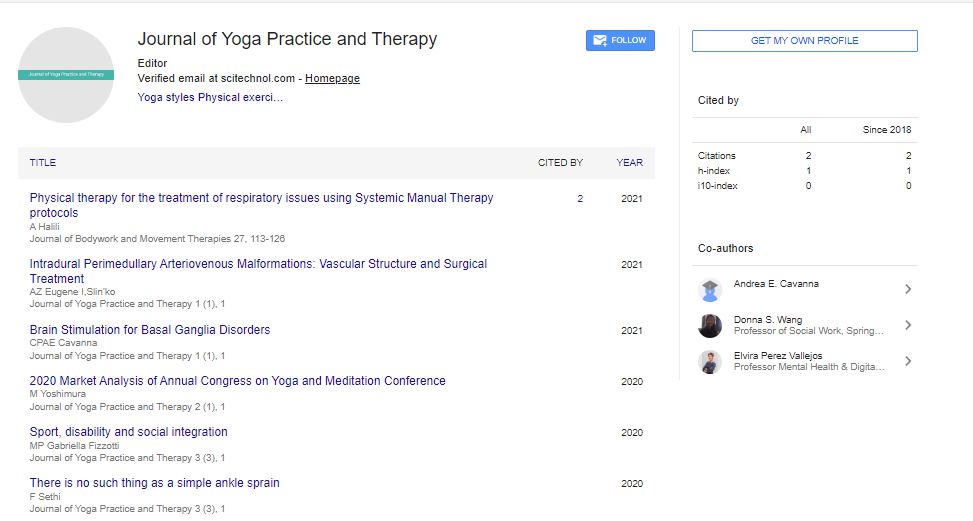Short Communication, Vol: 6 Issue: 1
The Art and Science of Meditation: Unlocking the Power of Mindfulness for Mental Well-Being
Feten Fekih-Romdhane*
Department of Psychiatry Ibn Omrane, Razi Hospital, Manouba, Tunisia
*Corresponding Author: Feten Fekih-Romdhane
Department of Psychiatry Ibn Omrane, Razi Hospital, Manouba, Tunisia
E-mail: feten.Romdha @gmail.com
Received date: 27 February, 2023, Manuscript No JYPTY-23-95020;
Editor assigned date: 01 March, 2023, Pre QC No. JYPTY-23-95020(PQ);
Reviewed date: 15 March, 2023, QC No. JYPTY-23-95020;
Revised date: 22 March, 2023, Manuscript No. JYPTY-23-95020(R);
Published date: 29 March, 2023, DOI: 10.4172/jypty.1000115
Citation: Romdhane FF (2023) The Art and Science of Meditation: Unlocking the Power of Mindfulness for Mental Well-Being. Int J Yoga Therap 6:1.
Description
Meditation has been practiced for centuries as a means of cultivating mindfulness, relaxation, and mental clarity. In recent years, research has increasingly recognized the numerous benefits of meditation for mental health and well-being. This manuscript explores the art and science of meditation, providing an overview of its history, techniques, and applications in modern society. Drawing upon a review of the current literature and evidence-based research, this manuscript delves into the physiological, psychological, and neuroscientific mechanisms underlying the practice of meditation. It also discusses the practical applications of meditation in various settings, including healthcare, education, and workplace, and highlights the potential benefits of incorporating meditation into daily life for improved mental well-being [1]. Meditation has a rich history that spans across cultures and time periods. From ancient Eastern traditions to modern Western practices, meditation has been utilized as a means of achieving inner calm, mental clarity, and spiritual enlightenment. In recent years, there has been a growing interest in meditation in the scientific community, as research has revealed its potential benefits for mental health and well-being. This manuscript aims to provide a comprehensive overview of meditation, exploring its art and science, and shedding light on its practical applications in modern society [2]. Meditation has its roots in ancient Eastern cultures, with evidence of its practice dating back thousands of years. It has been an integral part of spiritual and philosophical traditions such as Buddhism, Hinduism, and Taoism, among others [3]. In these traditions, meditation was seen as a means of transcending the limitations of the self and attaining a deeper understanding of reality. Meditation techniques were often used as a way to cultivate mindfulness, concentration, and insight, leading to enhanced selfawareness and expanded consciousness [4].
Over time, meditation spread to other parts of the world and evolved in different forms. In the Western world, meditation gained popularity in the 20th century as a means of relaxation and stress reduction [5]. In recent years, it has gained recognition in fields such as healthcare, psychology, and neuroscience for its potential benefits in improving mental well-being.
Types of meditation techniques
There are numerous meditation techniques that have been developed and practiced throughout history [6]. Each technique has its unique focus and purpose, but all share the goal of cultivating mindfulness, concentration, and self-awareness. Some of the most commonly practiced meditation techniques.
Mindfulness meditation: This technique involves paying non-judgmental attention to the present moment, including one's thoughts, emotions, and sensations, without trying to change or analyze them [7]. It aims to cultivate a heightened state of awareness and acceptance of one's experience in the present moment.
Loving-kindness meditation: Also known as "Metta" meditation, this technique involves cultivating feelings of compassion, love, and goodwill towards oneself and others [8]. It focuses on developing a positive and empathetic mindset towards oneself and others, and is often used as a means of enhancing positive emotions and social connections [9].
Concentration meditation: This technique involves focusing one's attention on a single object, such as the breath, a word, or an image, to develop sustained concentration and mental clarity. It aims to calm the mind and develop a state of focused awareness[10].
Body scan meditation: This technique involves systematically scanning one's body with the intention of developing awareness of physical sensations and relaxing tension. It is often used as a means of reducing stress, promoting relaxation, and developing a mind-body connection. Movement-based Meditation: This includes practices such as Tai Chi, Qi Gong, and Yoga, which combine physical movements with mindfulness and breath awareness to cultivate.
References
- Perez-De-Albeniz A, Holmes J (2000) Meditation: Concepts, effects and uses in therapy. Int J Psychother 5: 49-58
- Goleman D (1971) Meditation as meta-therapy: Hypotheses toward a proposed fifth state of consciousness. Transpers Psychol 3 1-25
- Smith JC (1975) Meditation as psychotherapy: a review of the literature. Psychological Bulletin. 82: 558
[Crossref] [Google Scholar] [PubMed]
- Ando M, Natsume T, Kukihara H, Shibata H, Ito S (2011) Efficacy of mindfulness-based meditation therapy on the sense of coherence and mental health of nurses. Health. 3: 118-22.
- Koszycki D, Benger M, Shlik J, Bradwejn J (2007) Randomized trial of a meditation-based stress reduction program and cognitive behavior therapy in generalized social anxiety disorder. Behav Res Ther 45: 2518-26
[Crossref] [Google Scholar] [PubMed]
- Koszycki D, Benger M, Shlik J, Bradwejn J (2007) Randomized trial of a meditation-based stress reduction program and cognitive behavior therapy in generalized social anxiety disorder. Behav Res Ther 45: 2518-26
[Crossref] [Google Scholar] [PubMed]
- Catani C, Kohiladevy M, Ruf M, Schauer E, Elbert T, et.al (2009) Treating children traumatized by war and Tsunami: a comparison between exposure therapy and meditation-relaxation in North-East Sri Lanka. BMC psychiatry. 9: 1-1
[Crossref] [Google Scholar] [PubMed]
- Ong JC, Shapiro SL, Manber R (2009) Mindfulness meditation and cognitive behavioral therapy for insomnia: a naturalistic 12-month follow-up. Explore (NY) 5: 30-6.
[Crossref] [Google Scholar] [PubMed]
- Bogart G (1991) The use of meditation in psychotherapy: A review of the literature. Am J Psychother 45: 383-412
[Crossref] [Google Scholar] [PubMed]
- Montero-Marin J, Garcia-Campayo J, Pérez-Yus MC, Zabaleta-del-Olmo E, Cuijpers P (2019) Meditation techniques v. relaxation therapies when treating anxiety: A meta-analytic review. Psychological medicine. 49: 2118-33
[Crossref] [Google Scholar] [PubMed]
 Spanish
Spanish  Chinese
Chinese  Russian
Russian  German
German  French
French  Japanese
Japanese  Portuguese
Portuguese  Hindi
Hindi 